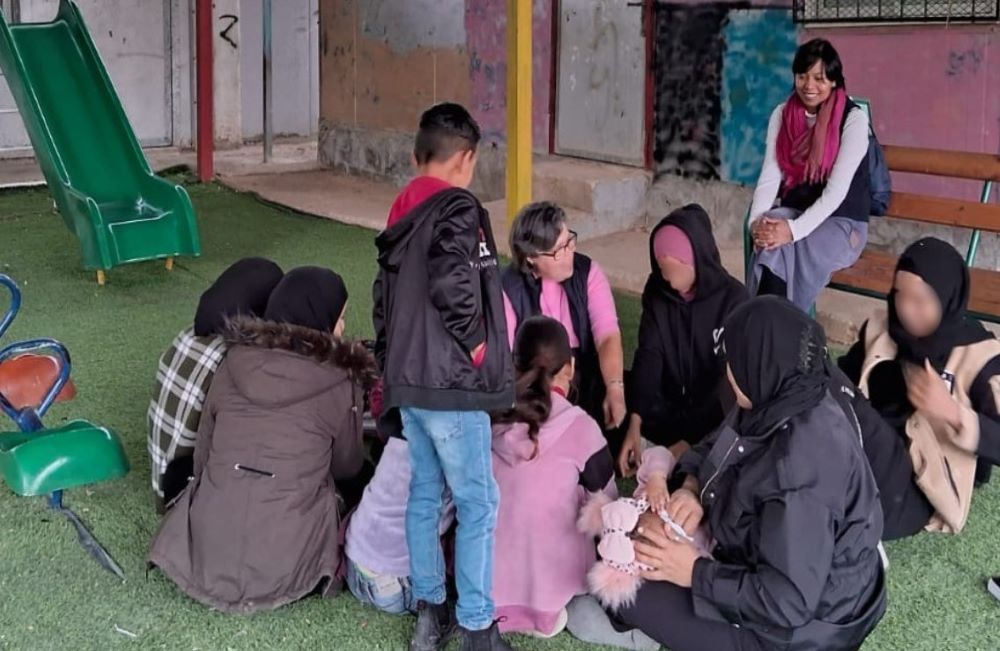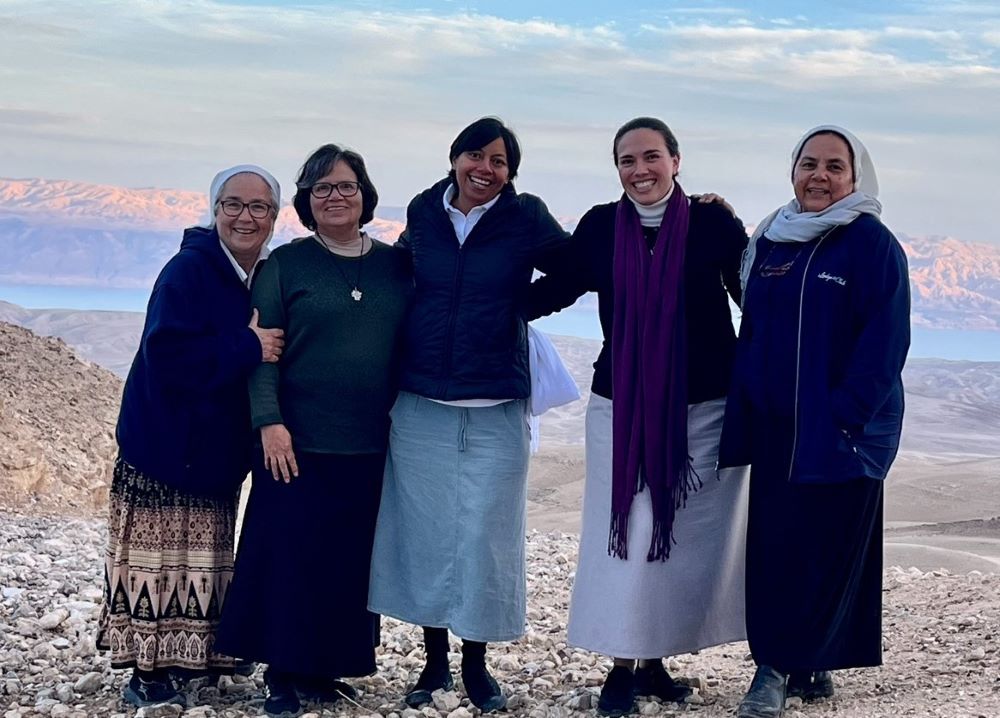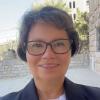A Bedouin shepherd watches his flock in the Judean Desert. (Courtesy of Julia Hurtado)
Here we are in Advent, the time of waiting, reflecting and preparing for Jesus' birth. I can't help but be amazed by the scenery as we drive in the Judean Desert to visit the Bedouin camps. We see many sheep and one or two young shepherds with their flock. I love seeing the shepherds guiding their sheep and goats. Just a couple weeks ago, the desert was dry, but with two days of light rain, the brown desert is showing signs of life; the brown has turned green as dormant seeds sprouted overnight with just a bit of water from heaven. I think of the dormant seeds in our souls during this Advent and how, like the desert seeds, new growth comes with prayer and God showering us with his love and blessings.
Here we are in the late autumn season. It's a time when it gets dark early, and the days are colder. It feels like a reflection of the times; so much darkness and violence in our world. It's a time when we need the Light of Christ, the Peace of Christ, to see others as brothers and sisters.

Sr. Julia Hurtado teaches English to women, teens and preteens. (Courtesy of Julia Hurtado)
As I reflect on my ministry with the Bedouins, the people of the desert, I feel blessed to use my nursing skills to help them. At times, I have made recommendations for some to go to the hospital or to a doctor. Some do, but others say they can't afford to go to a doctor or afford medical tests, X-rays or MRIs. I am delighted to say that some patients have followed my recommendations. For example, there is one woman, a diabetic, whose blood sugar was very high, sometimes over 300.
Sr. Expedita, a Camboni sister, translated for me, and we did some diabetic teaching. We explained different foods that would affect her blood sugar levels, taught her about her medication, and explained what happens when blood sugar levels are too high and how it can harm the body. She said she understood, and I am thrilled that her blood sugars have been within the normal range the last two times I visited.
We sat in an open wooded temporary covering outside her one-bedroom aluminum and plywood home. The other little building was a kitchen for cooking and making hubus shrak — like an extra-large tortilla, their staple food. Before I had finished, her daughter brought us some very hot sweet tea with sage, as they always do. We sat on the cushions and talked about her health, some of their concerns and the beautiful scenery. I said that I love being in the desert, seeing the open space and the hills in the distance, and I especially love seeing the animals.
The sun sets in il Montar in Judea. (Courtesy of Julia Hurtado)
A short time later, her son herded three little kid goats, about a week old, to where we were sitting. I was surprised, and I grinned. True to their culture, even the animals were welcome to their home. Then her grandson brought in a little kid goat whose front legs were deformed and could barely stand. He must have been only a few days old because he still had a small dried piece of the umbilical cord.
The boy carried the goat gently and close to his chest, then placed it right in front of me so I could get a closer look. He was a beautiful little boy with bright eyes and a big smile. He knew their animals and which needed more care. This scene touched my heart deeply and has been in my prayers this week. "I am the good shepherd. The good shepherd lays down his life for the sheep" (John 10:11). All I could think about was this boy's innocence, his pure spirit of caring for this animal that would die without his love and attention. I thought of our merciful God, his tenderness, and his complete and utter love for his flock; everyone is important and loved unconditionally.
This little goat could easily get separated from the flock, and I could picture this little boy returning to pick him up and carry him back home. Just as Jesus told us in the parable of the lost sheep, as Jesus would leave the 99, so this little shepherd boy would do the same and go after the one who needed him the most. "And when he finds it, he lays it on his shoulders and rejoices" (Luke 15:4-5).

Sr. Julia Hurtado (second from left) poses with Camboni Srs. Expedita Pérez Leon, Lourdes (Lulu) Garcia Grande, Lorena Sesatty Saenz and Cecilia Sierra Salcido on El Montar, the highest hill, with the Dead Sea in the background. The Bedouins guided the group to this scenic spot during their journey." (Courtesy of Julia Hurtado)
Each of us is like that little kid, being held and carried by a loving, joyful God who rejoices when we are found and who also weeps when we are hurt or suffering. I can't help but think of all the people affected by the war and all who are being killed and suffering horrific, untold pain and hardships, trying to cope with loved ones who were killed, so much hunger and thirst, and also those who are being held hostage.
When the people talk about the pain of seeing what is happening, they say, "Ya Rab! Ya Allah!" ("My Lord, my God!") The most common expression among Christians and Muslims is "Al-hum-du-lilla – Praise be to God/Allah." It is said when life is good, and one thanks God for everything, and even when life is terrible and people are in the midst of suffering, it is always Alhumdulilla. Its meaning is embedded in their very souls, even children say Alhumdulilla. It means thanking God because he loves, protects, created, has mercy, is all powerful and knows each one of us. The phrase is even more powerful than death itself; if someone dies as the tears roll down their cheeks, they say Alhumdulilla because God/Allah is greater than death, and they have gone to God, the Good Shepherd who knows his sheep.
Advertisement
Finally, as we prepare for Jesus' birth, I have come to understand why the first people to hear the Good News of Jesus' birth were the shepherds — the Bedouins, people who open their hearts and homes to all. I have seen a strong connectedness with the earth and all the creatures and animals. In Luke 2:8-20, we read:
The angel said to them, "Do not be afraid; for behold, I proclaim to you good news of great joy that will be for all the people. For today in the city of David a savior has been born for you who is Messiah and Lord. And this will be a sign for you: you will find an infant wrapped in swaddling clothes and lying in a manger."
And suddenly there was a multitude of the heavenly host with the angel, praising God and saying: "Glory to God in the highest and on earth peace to those on whom his favor rests."
I like to imagine that not only the shepherds but their wives went with them to Bethlehem to help a young woman (as they still do today) who had just given birth. They were the first to see the beautiful face of baby Jesus, the Messiah, our Emmanuel. "Then the shepherds returned, glorifying and praising God for all they had heard and seen, just as it had been told to them" Luke 2:20.
My prayer is that during this horrific time the Prince of Peace may bring peace to his homeland and peace throughout the world.







